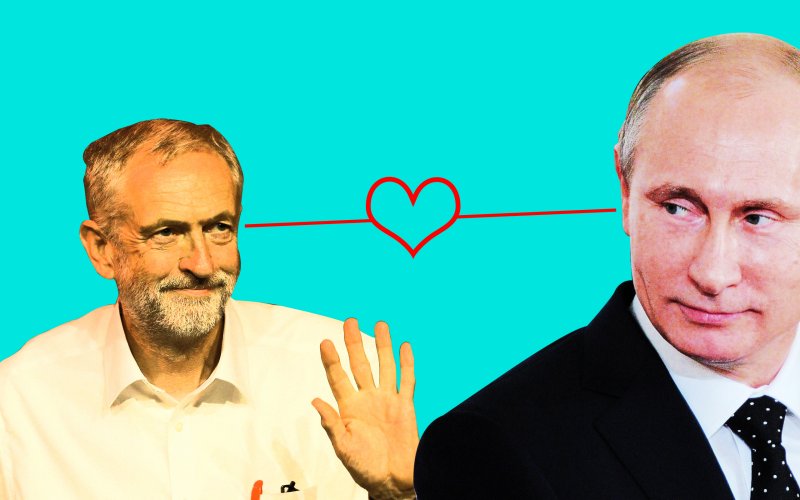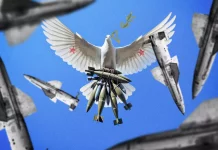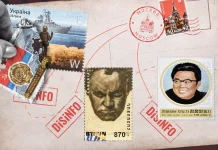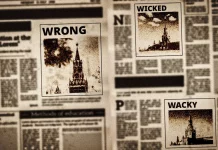
Labour just suffered an election catastrophe, but that hasn’t stopped the Kremlin from pushing far-left Jeremy Corbyn’s candidacy for party leader.
Britain’s standard-bearer liberal newspaper The Guardian may have rejected Jeremy Corbyn for Labour Party leader, but he has one media outlet solidly in his corner: RT. The Kremlin-funded propaganda channel is actively pushing the far-left parliamentarian’s candidacy — and in a British media market in which RT claims some 2.5 million viewers a quarter.
Since Corbyn declared his bid to become Britain’s opposition leader, RT’s website has written about him almost as often as it has about current Prime Minister David Cameron—but in a far more flattering light. From June 1 to August 10, RT headlined 25 stories with Corbyn’s name, compared with 32 covering Cameron. Bearing in mind that Corbyn is just one of four candidates to lead an opposition party in disarray, while Cameron heads the country, the coverage given to the Labour veteran is striking, to say the least.
As is the tone of the coverage. Of the 25 headlines bearing Corbyn’s name, 21 were positive or neutral, while just four were negative—a proportion of 84% positive. Of Cameron’s 32 headlines, 16 were positive or neutral, while 16 were negative, a proportion of 50%.
Now, it could be argued that the prominence given to Corbyn stems from interest in the broader Labour leadership race; after all, given that the party has just suffered an election catastrophe, questions over its future direction are entirely legitimate. However, if that were the case, it would also be legitimate to expect a similar level of coverage for Corbyn’s rivals, Andy Burnham, Yvette Cooper, and Liz Kendall.
In fact, there is no comparison. Where Corbyn’s name featured in 25 RT online headlines between June 1 and August 10, Cooper was headlined twice, and Kendall once. Burnham’s name did not make it at all, though he may be comforted to know he was headlined once as a “Labour MP”.
Nor is the imbalance in reporting confined to headlines. Corbyn has been mentioned more than twice as often as any of his rivals, his photo has been shown six times more than those of all his rivals put together, and he has been interviewed twice by RT, while his opponents have yet to be interviewed at all.
Even these figures understate the prominence he has been given, since roughly half the occasions on which the other candidates were mentioned were in stories which had Corbyn’s name in the headline.
To some extent, Corbyn’s prominence is a result of the surprise nature of his candidacy: RT is not the only channel to have paid more attention to the leadership contest since he threw his hat into the ring. However, it is instructive to compare RT’s online coverage in this respect with the BBC. While Corbyn is the most-headlined candidate on both websites, he accounts for roughly 43% of all candidate headlines (47 out of 110) on the BBC site, compared with 89% of the headlines on RT (25 out of 28).
Taken together, these figures indicate a clear RT bias in favor of Corbyn—one which goes well beyond what might be considered a journalist’s natural interest in an apparently outside candidate, and which includes both disproportionate coverage, and a disproportionate share of positive comment.
So why is the Kremlin-funded station pushing Corbyn’s candidacy so hard?
Unlike his rivals, Corbyn is no stranger to RT: He has been a regular commentator on and for the channel since 2007, when he was quoted criticizing Tony Blair’s Middle Eastern policy as threatening “a whole new conflict with Iran—a repeat of a complete disaster in Iraq.” Other quotes over the years included a 2010 call for the unilateral abolition of Britain’s Trident nuclear deterrent; accusations that the NATO-led presence in Afghanistan was strengthening the Taliban; and a comment that NATO is “out of date and out of time.” More recently, he stated that “Russia has pulled back from the border with Ukraine, and I would urge NATO to do the same,” and criticized the EU’s September 2014 decision to extend its sanctions on Russia.
These comments are entirely consistent with his declared principles over many years. However, they are also consistent with RT’s editorial policy of promoting those who oppose Britain’s traditional policies of nuclear deterrence, military investment and NATO and EU membership.
For example, in May 2014 it breached British rules on election coverage by reporting on an apparent surge in support for the anti-EU United Kingdom Independence Party when polling stations had already opened. The channel blamed the breach on an “administrative error.
In September 2014 it threw its weight behind the Scottish National Party’s bid to break up the UK—not only providing strongly pro-independence coverage before the poll, but reporting on claims afterward that the outcome had been rigged. (This author experienced the impact of the latter firsthand, being told by a disgruntled “Yes” voter in Edinburgh shortly after the poll, “It was fixed. The Russian monitor said so, I saw it on RT.”)
In short, RT has a track record of backing election candidates whose policies would be likely to make Britain more fragmented, more isolated and less militarily capable — and of doing so by foul means as well as fair.
Jeremy Corbyn might want to think long and hard before he talks with the channel again.
By Ben Nimmo, The Daily Beast





